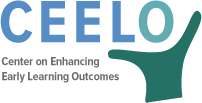These slides review program requirements related to assessment, a comprehensive framework for aligned assessment, and recommended practices. Jim Squires presented with Mary McLean (Head Start National Center on Quality Teaching and Learning/University of Florida) and Catherine Scott-Little (UNC-Greensboro) at the 2015 National Early Childhood Inclusion Institute.
States are working to build comprehensive early childhood assessment systems to answer key questions about young children’s learning and development and the effectiveness of early childhood programs. Research and best practice will help states as they make decisions and provide leadership in developing, adopting and providing guidance on assessment of children, programs, and educators; providing professional development on how to administer and use the results of assessments; and supporting timely, useful reporting of assessment data to early childhood programs, teachers, families, school districts and state policymakers.
Using Assessments to Improve Transitions to Kindergarten
This webinar features nationally known experts in discussion on how to integrate KEAs into a comprehensive assessment system and how to use the data to inform teaching practices. State departments of education presenters also highlight practical strategies they are using to assess a child’s school readiness and adjust instruction to help bridge any gaps. This webinar was co-sponsored by the Regional Education Laboratory (REL) Northwest. Presenters include CEELO’s Jana Martella and Tom Schultz, along with Jacqueline Jones (Foundation for Child Development), John Pruette (Office of Early Learning, North Carolina Department of Public Instruction), and Fiona Helsel (REL Northwest).
Tapping Teacher Evaluation Using Child-Level Data to Improve Teaching for All
This presentation highlights research and tools to help states design their teacher evaluation system. CEELO’s Lori Connors-Tadros and Jana Martella gave this presentation at the DaSy Early Childhood Conference.
Early Childhood Teachers in State Educator Evaluation Systems
This annotated bibliography offers resources on observations of teacher practice, student learning and growth, professional development, legislation and policy guidance, and national resources to support early childhood teachers in state teacher evaluation systems. (July 2014, Annotated Bibliography)
ECEC Evaluation: What Can We Learn from the Past?
This presentation provides information on maximizing policy of research and evaluation. It discusses the Perry Preschool Study, the Nurse Family Partnership, and NJ Abbott pre-K program. It concludes with lessons learned for program evaluation. The slides were presented by CEELO’s Steve Barnett at the Transatlantic Forum on Inclusive Early Years in Amsterdam. (July 2014, Presentation)
Definitions and Approaches to Measuring Reading Proficiency
This resource reviews selected resources on national and state definitions of literacy and reading to inform a state definition of reading proficiency. This information can be helpful to guide efforts to ensure all children are supported in developmentally appropriate literacy and reading skills. The resource identifies national and state approaches to measuring reading proficiency.
Kindergarten Entry Assessments: Helping Teachers and State Policy Leaders Improve Learning Opportunities and Outcomes for Young Children
This presentation discusses opportunities and implementation challenges in states and features presentations from Arizona, Iowa, Missouri, and Nevada on the implementation of KEA in each state. These presentations were given by CEELO’s Tom Schultz and representatives from states at the 2014 NAEYC Professional Development Institute.
Considerations for ‘Rebranding’ Kindergarten Readiness Assessment
This document explores the branding of kindergarten readiness assessments in different states. It examines how states developed their early childhood assessment systems and the funds that have supported the development and implementation of assessments. Also included is the name and description of the instrument or system used for kindergarten readiness assessment in six states.
Early Childhood Assessment
This annotated bibliography highlights resources on CEELO’s website on topics related to early childhood assessment, including policy reports, FastFacts, webinars, and videos.
Don’t Just Do the Assessment, Look at It
This resource examines examples and challenges in using assessment data, discuss what data can tell us about teaching and learning, and offers resources on using assessment data. CEELO’s Tom Schultz gave this presentation to the New Jersey Early Childhood Academy.
Formative Assessment: Guidance for Early Childhood Policymakers
This report serves as a guide and framework to early childhood policymakers considering formative assessment, outlining issues for consideration in implementing formative assessment.This guide provides a practical roadmap for decision-makers by offering several key questions to consider in the process of selecting, supporting, and using data to inform and improve instruction.
State of the States Policy Snapshot: State Early Childhood Assessment Policies
This policy brief addresses the questions: What child assessments are required of pre-K and Kindergarten providers? How are child assessment data used? The brief is based primarily on secondary analysis of data collected in the NIEER State of Preschool Yearbook and presents a snapshot of responses to questions about child assessment.
